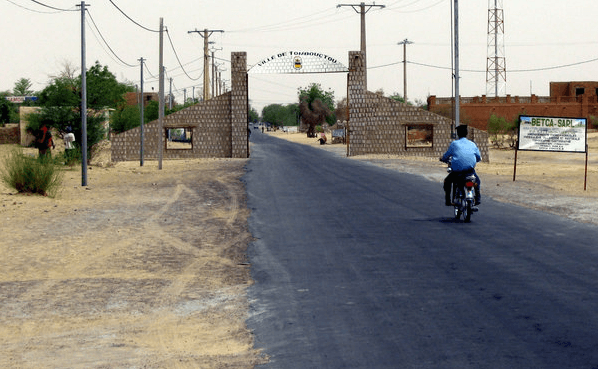Tourist trade dries up as Mali struggles with Islamist insurgency
The streets of Mali are mostly empty now in the wake of the violence that’s gripped the north and scared tourists away. (Photo by Bonnie Allen.)
Searching for a tour guide on a dusty street in Ségou, a town about 150 miles north of Mali’s capital, Bamako, is unusual these days.
And hard, too.
Normally, guides loiter outside hotels and restaurants, eagerly wooing any foreigner who enters this charming riverside town.
These days, they’ve all but given up. Ever since the military coup in March, and the takeover in the north by Islamic extremists, tourists have been staying away.
A group of tour guides — all young men — are playing cards, smoking cigarettes and drinking tea. One of them says since the crisis began they’ve been sitting around doing nothing.
“We don’t have a job. We don’t know what to do. We all live off tourism. When there are no westerners, we just sit. All the youth are unemployed. Frankly, we are fed up,” he said.
Moving through the city, street peddlers are surprised to see someone foreign. Sulaimon Dambale, who hawks miniature xylophones, is disappointed to see a journalist, rather than a customer.
He hasn’t sold anything today, not a thing.
At the once-popular Hotel Djoliba, the manager, a Canadian named Gino Pelletier, sits on the empty patio with a cup of coffee.
“People would leave Bamako and stop overnight in Segou and then continue on the road to Timbuktu, so you would see 60 to 70 people just coming down and filling the hotels,” Pelletier said. “Since the coup, I haven’t seen any tourists.”
He says they’ve laid off half of their staff since March, and stopped buying vegetables from local vendors for their restaurant.
“It’s an economic crisis,” he said. “If I don’t buy, then the woman who is selling the carrots or the salad doesn’t sell. So this has an impact on her family.”
The troubles actually began in 2009 when an al-Qaeda affiliate operating in the north kidnapped four European tourists and later executed one. Foreign embassies started issuing travel warnings. Now, with a military coup and Islamist extremists occupying the north, Mali’s tourism sector, the country’s third largest industry, has collapsed.
On the shore of the Niger River, thousands of orange clay pots are piled high. Mariam Keita says the profits from selling pottery to foreigners used to feed 10 people in her family, including her husband and their four children. She says her husband lost his job as a teacher because families can no longer afford to pay school fees.
They even had to pull their 12-year-old son out of school.
“I feel sick,” Keita said. “If westerners were coming to buy my pottery, then I would make some profit, I could help my husband out, pay for rent and electricity. I could provide for the family. But it’s tough.”
A small round pot sells for just a dollar, a tiny fraction of what most tourists would spend in the past.
Mali used to get 170,000 tourists a year, and each spent on average $100 a day.
Without that cash influx, you can see the trickle down effect on Malian families — in the empty streets, empty pockets and empty stomachs.
